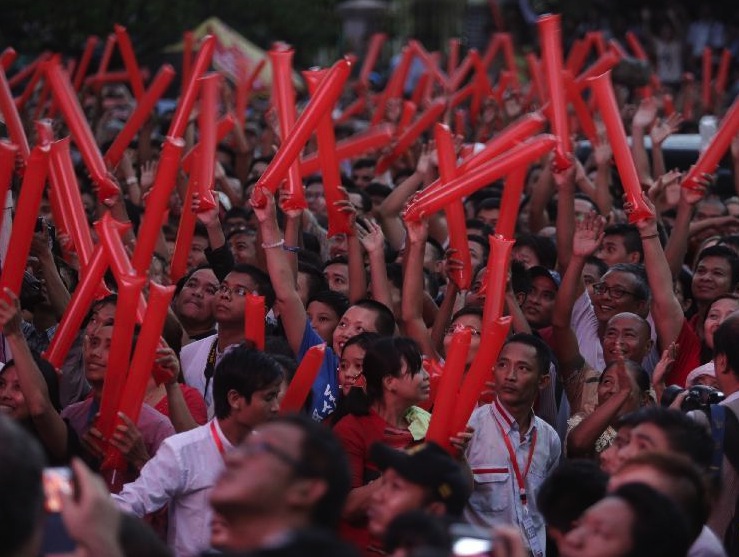-
Myanmar: What does an NLD Victory Mean for Foreign Investors?
-
Although official results will not be known for days, Myanmar’s NLD party is poised to win a landslide victory, by most accounts well above the 67 percent threshold it needs to select the President and govern without the veto of the military and its allies in the ruling Union Solidarity and Development Party (USDP). Assuming there is no wild card scenario – such as the military or USDP rejecting the results – what does an NLD landslide victory mean for foreign investors?
Short-term political risk heightened
First of all, short-term political risk will be heightened as the governing transition takes place. The NLD would be wise to give an olive branch to the USDP and bring them into their government to fill some senior positions – this would not only placate the military-backed party but also provide much needed governing experience that the NLD simply does not have. This scenario would heighten stability as well as provide a better governing framework.
Loosening of sanctions
Positively, an NLD victory will almost certainly lead to a further loosening of Western sanctions and more engagement by the United States and Western powers that have long supported pro-democracy forces in the country. In the best case it could even lead to an end of all sanctions except arms, as told by a diplomatic source to one of our local partners who cited the main stipulation for this would be a free and fair election – which would certainly be deemed the case should an NLD landslide victory be accepted.
Although Western sanctions have already been largely eased, they remain a key obstacle to doing business in Myanmar both from a regulatory and reputational standpoint. As a case in point, several Western banks including Citigroup Inc, Bank of America, HSBC and PNC Financial have recently cut trade finance in Myanmar after learning that part of the country’s main port is run by a company controlled by a man blacklisted by Washington, U Tun Myint Naing, aka Steven Law, who runs the Western-sanctioned Asia World Group. We looked into Asia World Group as one of our early due diligence projects in Myanmar and it was no secret that the company was established on drugs money and that Law had a dubious past linked to the drugs trade and lucrative economic ties with the country’s generals. It was also open source information that Asia World Group ran the Asia World terminal at Yangon’s main port, which financial institutions could have easily known many years ago.
While sticking points on the issue of sanctions like the Yangon port case will remain, an NLD-led government will lead to a much looser sanctions regime – and likely very quickly.
No clear Foreign Investment policy
What remains relatively unclear, however, is how far – or how little – an NLD government will go to encourage foreign investment. The NLD has been notoriously vague on promulgating any of its policies including on crucial matters such as energy or finance. The clearest policy statement we can find on the NLD’s stance on foreign investment is a vague statement that it will encourage foreign direct investment “on condition of compliance with domestic laws and international human rights standards”. While we believe an NLD government would be committing political suicide to restrict foreign investment that would ultimately stall the country’s economic engine fueled by the reforms implemented by the USPD, there is a possibility that some protectionist policies will be put forth that will be a discouragement to foreign investment. Yet, we believe an NLD government will be more pragmatic and put forth investment policies in line with openness and the country’s economic reform process.
Wait and see
In the short term, we expect most foreign investors to wait on the sidelines until the political transition and uncertainty settles, in the best case scenario by the end of the first quarter 2016. Once Parliament is in place in early 2016, MPs will vote for the President, nominating three candidates with the two runners-up taking the two Vice Presidential posts. This vote will likely not take place until March, thus we are still several months away from the establishment of Myanmar’s next ruling government and a historic transition away from military-dominated rule. Still, with the military able to maintain key positions and powers as outlined in the 2008 military-drafted constitution, many things will remain unchanged on a systematic level. This, however, will also be a harbinger of stability.

